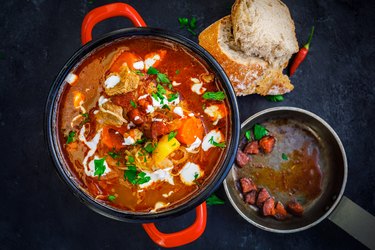
That soy feta or cashew camembert can be a culinary godsend when you eat a plant-based diet or you limit or avoid dairy foods. But is vegan cheese healthy, actually?
While it's often assumed that nondairy alternatives are better for you because they're made from plants, the health halo isn't always deserved. "Many people assume that anything labeled 'vegan' is automatically healthy, but that's not always the case," says Sue James, RDN, owner of Pinnacle Health and Wellness LLC.
Video of the Day
Video of the Day
That doesn't mean vegan cheese has to be off the table, though. Instead, it's important to pay attention to product labels and enjoy your cheesy analog in moderation, experts say. Here's what you should know.
What Is Vegan Cheese Made Of?
Vegan cheese is a cheese alternative typically made from nondairy ingredients like cashews, almonds, soy, oats, coconut oil, palm fruit oil and emulsifying agents like gums or starches. You'll find a variety of options on store shelves, but in general, there are two main types, according to dietitian Justin Perr, RD, owner of Preserv Wellness.
- Nut-based vegan cheeses, which are often made from cashews and fermented with the help of probiotic bacteria.
- Oil-based vegan cheeses, which tend to be a combo of plant oil, starches or gums, plus flavorings. Oil-based cheeses are often more processed than their nut-based counterparts.
Is Vegan Cheese Healthy?
Vegan cheese can be part of a healthy diet. That said, it's not necessarily a healthier alternative to dairy cheese.
"Vegan cheeses are all mimicking something that is delicious and on the indulgent side," says dietitian Heather Alioto, RD, wellness manager at ISS Guckenheimer. So whether you're enjoying a dairy cheese or one that's dairy-free, it'll likely be calorie-dense and rich in saturated fat and sodium.
Also worth keeping in mind: While vegan cheese tends to be rich and indulgent like dairy cheese, it's often low in the beneficial nutrients that dairy cheese is known for, like calcium and protein, James points out.
The bottom line? It's important to read a cheese's ingredient list and nutrition label to know exactly what you're getting. Then you can make an informed choice about whether a product is right for you.
Benefits of Vegan Cheese
Your coconut brie or mozz-less shreds have some good things going for them, including:
- Nondairy alternative. If you're craving something cheesy but you don't eat dairy or you can't tolerate it, vegan cheese can be a satisfying option.
- More environmentally-friendly. Dairy-free alternatives tend to use less water and emit fewer greenhouse gases compared to dairy products, according to a 2021 review in Sustainability. (Almond-based products, which use more water, are the exception, the study found.)
- May be lower in calories. Some cheese alternatives might contain fewer calories than their dairy-based counterparts, suggests a March 2022 Nutrients paper looking at the nutritional profile of vegan cheeses. That could be helpful if you're watching your weight. On the downside, lower-calorie cheeses may not be as rich or creamy.
Drawbacks of Vegan Cheese
That said, you may not want to rely on the stuff as an everyday staple. Some downsides include:
- Low in protein in calcium. On average, dairy cheeses have 5 to 8 grams more protein per serving than vegan cheeses. They also offer up between 10 and 20 percent of your daily calcium needs, which is much higher than most vegan cheeses, the Nutrients paper found. "That can be a drawback for growing children, older adults and athletes," James says, because folks in these groups generally need more protein and calcium in their diets.
- High in saturated fat. Because vegan cheeses often get their richness from coconut or palm oils, they tend to serve up a similar amount of saturated fat as dairy cheese. "Since saturated fat is closely linked to heart disease, it's essential to assess the overall nutritional profile rather than assume all vegan cheeses are heart-healthy," James says.
- Often highly processed. Most vegan cheeses rely on additives to get their creamy texture and meltability (like cellulose powder or tapioca starch) along with preservatives like sorbic acid. They also tend to be high in sodium, the Nutrients review noted.
How to Add Vegan Cheese to Your Diet
There's no harm in adding some vegan cheese to your dairy-free nachos or pizza. Just remember that vegan cheese isn't typically healthier or more nutritious than dairy cheese, so it's best to enjoy it as a treat.
"I would recommend consuming vegan cheese in moderation — about once or twice a week — and being mindful of portion sizes. It's best to choose a cheese that satisfies [your] taste preferences while recognizing that it should be treated as an occasional addition rather than a staple," says James.
Also, keep in mind that some vegan cheeses may be more nutritious or less processed than others. "Some cheese substitutes use nuts as their base — that is a good start. Try to find items with the fewest, most natural ingredients," Alioto says. If the ingredient list is long or full of words you don't recognize, consider looking for a different cheese.
And if you're up for some experimenting, consider making your own vegan cheese at home. "Vegan cheese recipes are all over the internet. It's likely to be less expensive, and you'll have a much cleaner product," says Alioto.


